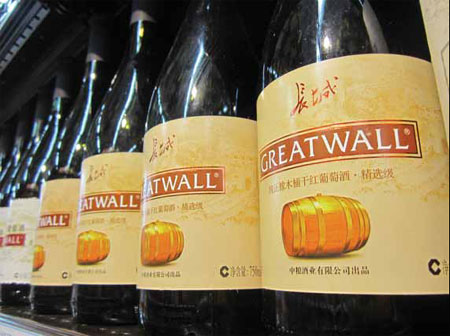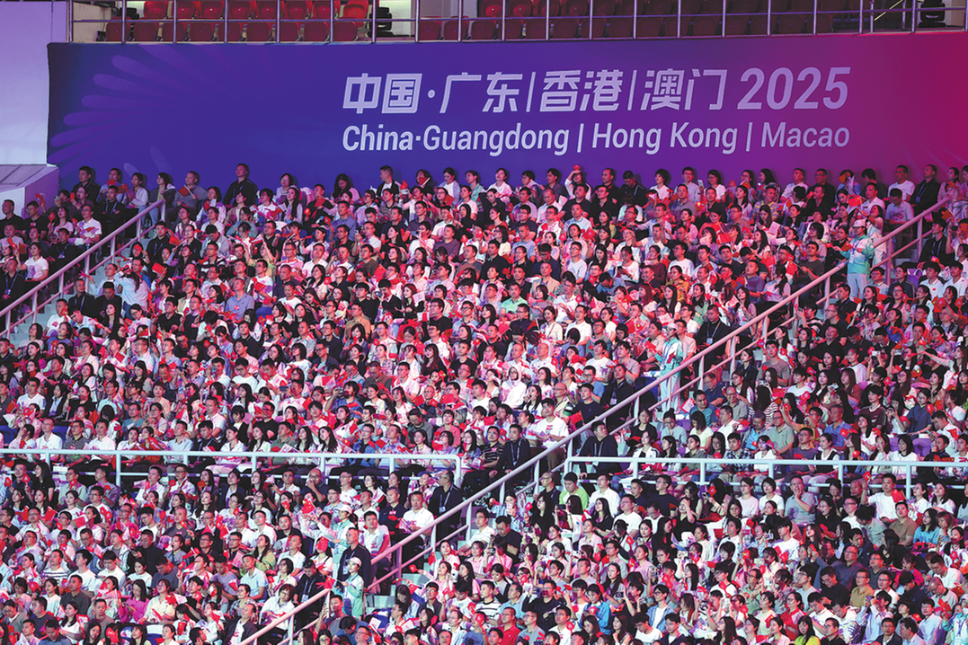On the way to exotic bouquets

| Great Wall lines the shelves in Chinese supermarkets. Provided to China Daily |
Chinese wine makers create new window of opportunity with unique oriental flavors
Oriental flavors are set to pep up the burgeoning wine market in China, even as old world and new world offerings strive to grab more attention in what is undoubtedly the fastest and biggest market for the drink in recent times.
Demand for wines has varied over the years in China, as it was never associated with mass drinking habits. Demand for old world wines, especially those from the Bordeaux region in France, have peaked in recent times, with some investors paying record prices at auctions, while other investors have gone on to acquire chateaux and wineries.
But companies like the State-owned conglomerate China National Cereals, Oils and Foodstuffs Corp (COFCO) are looking to blaze a new trail by creating a three-pronged global chateaux cluster comprising old world, new world and oriental wines.
"Wine consumption has grown by 20 percent every year in China. It is a huge growth opportunity and we are looking to expand into more segments of the domestic market with diversified products. The biggest advantage for us is the strong roots that we have in China," says Chi Jingtao, vice-chairman of COFCO and chairman of China Foods Ltd, the Hong Kong-listed unit of the company that manages the wine business.
Wine consumption in China increased by 33.4 percent year-on-year to 156 million nine-liter cases (12 bottles a case) last year, says the 2012 China Wine Market Report released by International Wine and Spirit Research. The nation is currently the world's fifth largest wine consumer after the United States, Italy, France and Germany. The report also indicates that consumption is set to grow by 54.25 percent between 2011 and 2015.
China's wine production is expected to reach 2.2 billion liters in 2015, compared with 1.09 billion liters last year, according to information provided by the China Alcoholic Drinks Industry Association (CADIA).
It is these impressive numbers that are prompting companies like COFCO to further expand their vineyard businesses. The company currently has three wineries in China, at Sanggan and Huaxia in Hebei province, and Junding in Shandong province.
Their sizes are 0.75 square kilometers, 0.7 sq km and 13.7 sq km, respectively.
The conglomerate recently acquired Chilean winery Biscottes and the Chateau de Viaud of the prestigious Bordeaux Lalande-de-Pomerol AOC in France. COFCO officials say the company will seek more overseas winery acquisitions to further diversify its portfolio of wines. The company is already a key player in the Chinese wine market with its Great Wall brand.
According to Chi, COFCO is planning to acquire wineries in Spain, Italy, Australia and the United States as part of its plan to broaden its wine range. "We will look for more high-end global acquisitions later, as the immediate priority is to have more products in the domestic market. No other market is growing as rapidly as China," Chi says.
China Foods Ltd posted revenue of HK$3.69 billion ($478 million, 360 million euros) in 2011, an 18.6 percent year-on-year growth.
The overseas expansion will also help the company build a broader supply chain and gain more expertise in wine making, say company officials. To some extent, these traits are also essential for the company to stay ahead of the competition, says Chi.
"The biggest challenge for COFCO is to successfully integrate employees in the acquired companies with its culture," he says.
"We retain most of the local employees, as they have more knowledge about grape cultivation and wine making. Our focus will essentially be on marketing and sales."
But COFCO is not relying only on its overseas acquisitions to boost productivity. The conglomerate is also stepping up oriental wine production at its domestic vineyards, with Chateau Junding as the testing ground.
"The Chinese wine industry has finished the accumulation of property and capital over the past three decades. Now there are 10 regions or wine producing areas, including the non-traditional Sichuan and Yunnan areas in China. It is time for us to start producing oriental wine," says Wu Fei, head of the wines and spirits branch at COFCO.
To spearhead its efforts in making oriental wines, COFCO has set up a complete industrial chain at Chateau Junding, including harvesting, bottling and packaging. It is the first chateau in Asia to set up luxury membership-based clubs to attract and serve potential consumers.
The chateau recently opened its 16th Huayue Wine Club in Beijing, targeting high-end customers with offers of premium wine, cuisine, golf, cigars and anything related to luxury.
"Junding is not a duplication of a Western chateau, but a complex platform to spread and express Chinese wine culture with an oriental lifestyle. But we have to admit that there is a distance between Chinese wine and top international wine brands. Junding is still learning from other wine makers and finding ways to boost output," says Chen Yunchang, owner of Chateau Junding and general manager of Huayue Wine Club.
"Fine wine is 70 percent dependent on good grapes and 30 percent on the wine making process. We have brought in the best kind of vines, but we also need a good wine maker, just as a decent restaurant needs a good chef," Chi says.
In August, COFCO brought in Michel Rolland, the world-renowned French wine maker, as technical director of its vineyards. Rolland was previously a consultant for Bordeaux producers, such as Chateau Angelus, Chateau Beau-Sejour Becot and Chateau Lascombes.
"COFCO's strategy of building a cluster of global chateaux may help reshape the framework of the global wine industry. Though China has been the world's largest beer producer, its wine industry is still young," says Yang Qiang, secretary of the wine committee of experts at the China Food Industry Association.
COFCO is not the only Chinese wine producer that is harboring ambitions of having global vineyards. Zhang Jinshan, founder of the Ningxia Hong group, recently acquired Chateau du Grand Moueys in France from its German owner. Ningxia Hong is a leading producer of gouqi, a Chinese spirit made from wolfberries.
"The wine making industry is now poised for take-off, with China's own interpretation of Western wine making culture," Yang says.
xiaoxiangyi@chinadaily.com.cn
Today's Top News
- China warns Japan against interference
- Nation's euro bond sale shows investors' confidence
- No soft landing for Tokyo's hard line
- Commerce minister urges US to increase areas of cooperation
- Strong demand for China's sovereign bonds signals global confidence
- Ministry urges Japan to 'maintain self-respect'































